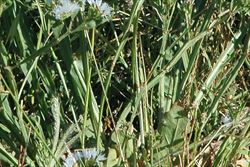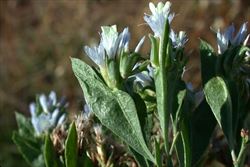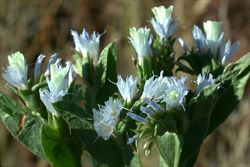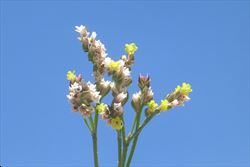Click on images to enlarge

habit (Photo: Rob and Fiona Richardson)

habit (Photo: Rob and Fiona Richardson)

winged stems and leaves (Photo: Rob and Fiona Richardson)

flower clusters (Photo: Rob and Fiona Richardson)

flowers from side-on showing stem wing ending in a stiff leafy lobe (Photo: Rob and Fiona Richardson)

flowers with pale blue papery calyx and whitish petals (Photo: Rob and Fiona Richardson)

close-up of flowers from side-on (Photo: Rob and Fiona Richardson)

native sea-lavender (Limonium australe), which has flowers with a pale pinkish calyx and yellow petals, and does not have winged stems (Photo: Chris Gardiner)
Scientific Name
Limonium lobatum (L. f.) Chaz.
Synonyms
Limonium lobatum (L. f.) KuntzeLimonium thouinii (Viv.) KuntzeStatice lobata L. f.Statice thouinii Viv.
Family
Plumbaginaceae
Common Names
statice, winged sea lavender, winged sea-lavender
Origin
Native to northern Africa (i.e. Algeria, northern Egypt, Libya, Morocco and Tunisia), the Canary Islands, south-eastern Spain, southern Greece and western Asia.
Naturalised Distribution
Widely naturalised in the drier inland regions, and some coastal areas, of southern Australia (i.e. in many parts of western New South Wales, in north-western Victoria, in large parts of South Australia and in the sub-coastal and inland regions of western and southern Western Australia).
Notes
Winged sea-lavender (Limonium lobatum) is regarded as an environmental weed in Western Australia and South Australia, and was recently listed as a priority environmental weed in at least one Natural Resource Management region.
In South Australia this species is a common coastal weed in the Gulf St. Vincent area, and has been recorded in conservation areas in other parts of the state (e.g. in the Flinders Ranges National Park and Halbury Parklands Conservation Reserve). In Western Australia winged sea-lavender (Limonium lobatum) grows in both disturbed sites and relatively intact native vegetation in the northern and eastern wheatbelt regions.
Winged sea-lavender (Limonium lobatum) is also listed as a common weed of shrubby riverine woodland and Woorinen mallee vegetation in Victoria, and has been recorded as a weed of Barkindji Biosphere Reserve in the north-western parts of this state. It is also a weed of rangelands in the Lower Murray Darling Catchment in south-western New South Wales, and has been recorded growing in the Paroo-Darling National Park.

